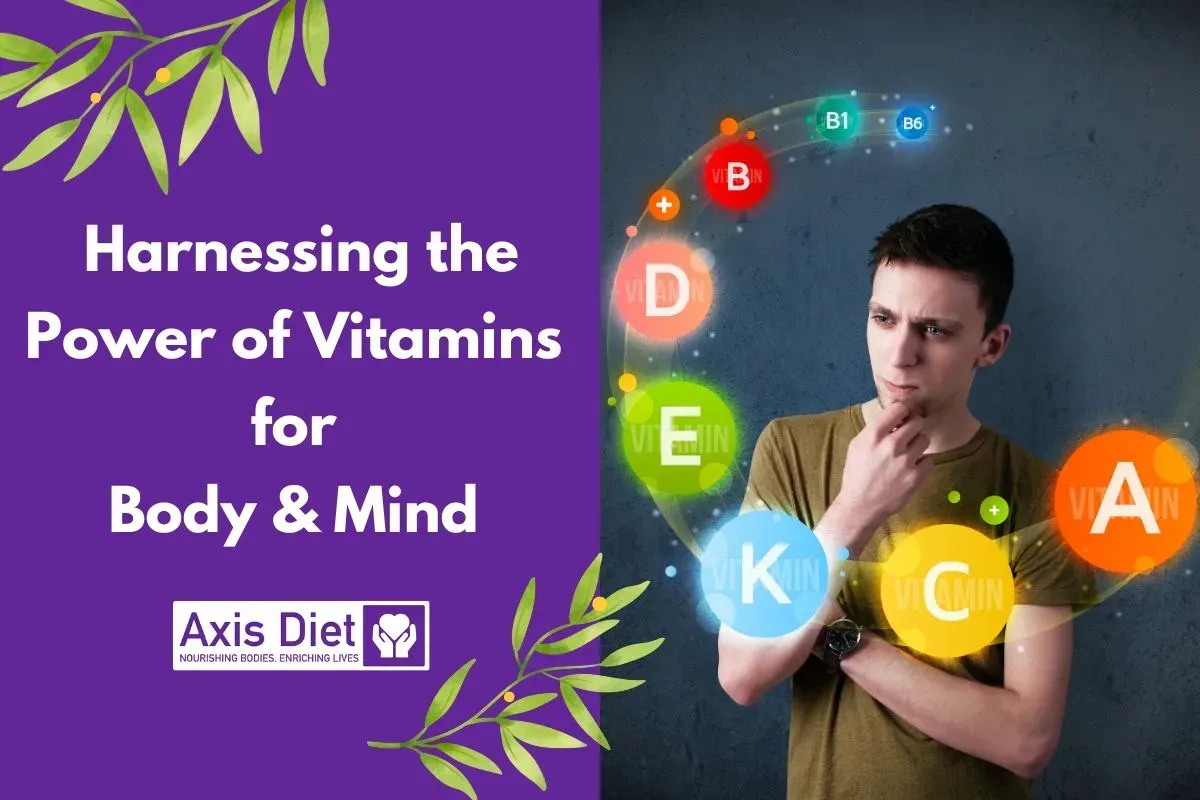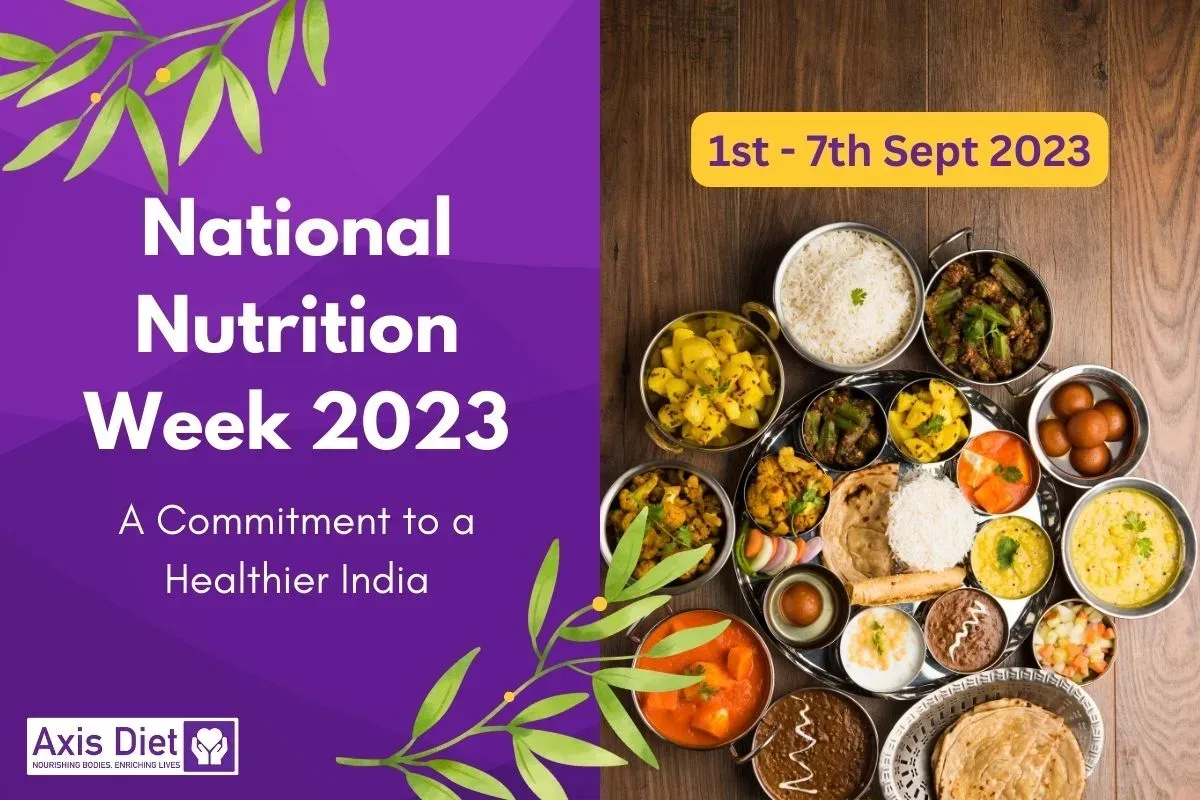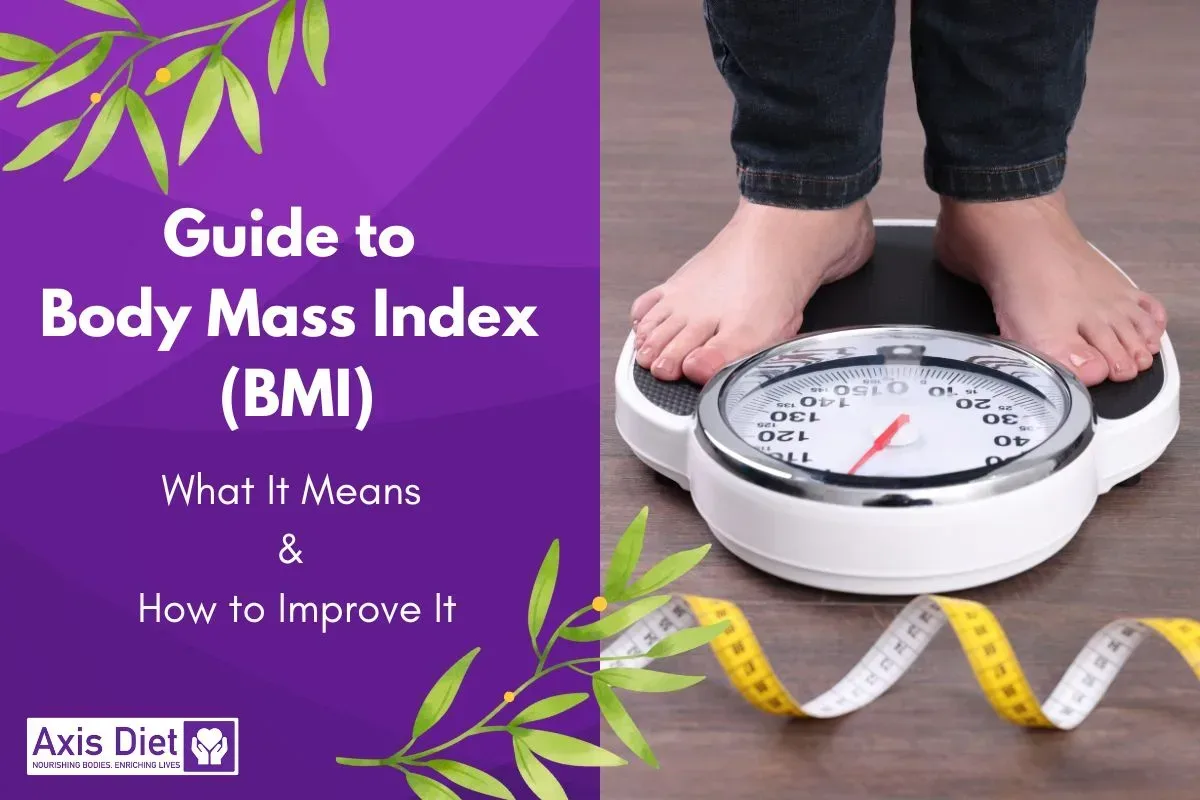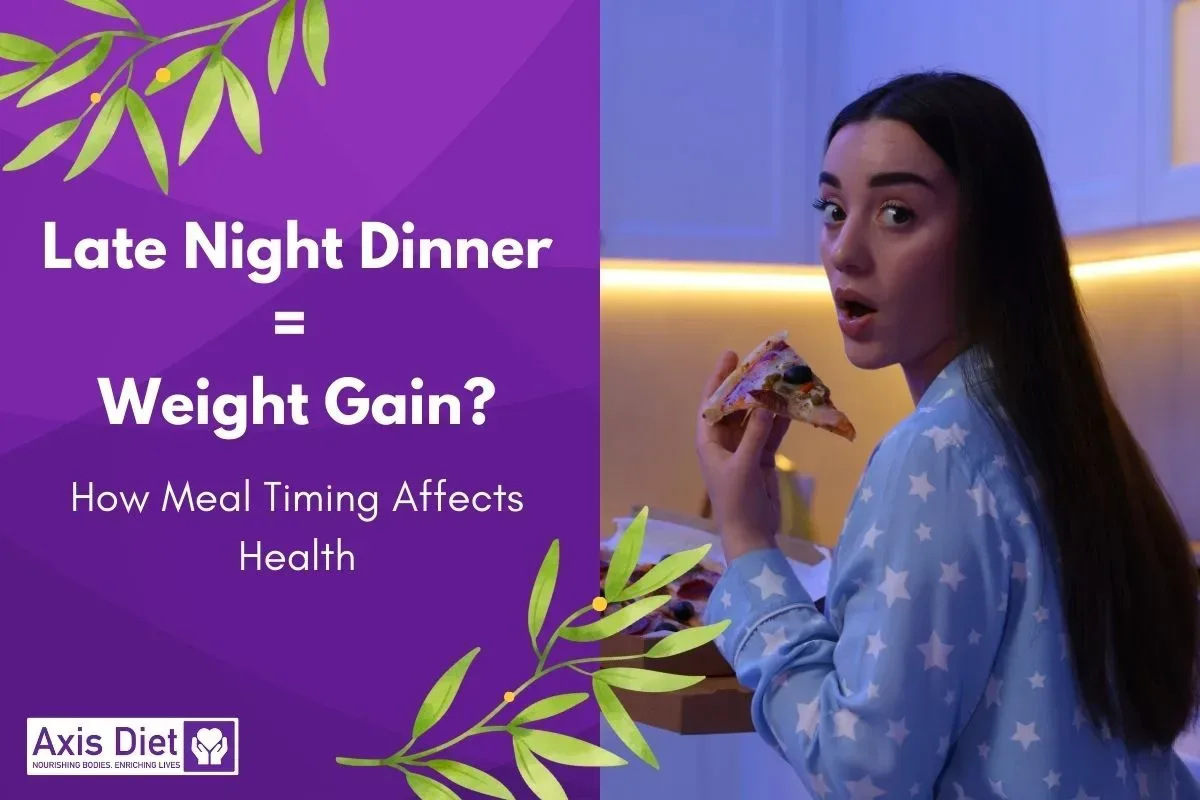Hello, health enthusiasts! Here at AxisDiet, we believe in empowering you to build a healthier life through knowledge and understanding. Today, we’re focusing on the essential role of vitamins in promoting wellness for both your body and mind.
Vitamins are critical for numerous bodily functions, and while we all know about their physical benefits, their significance in mental wellness is equally crucial. Let’s delve deeper into some key vitamins and how they help maintain holistic wellness.
Table of Content
Vitamin A: The Visionary Nutrient
Vitamin A, aptly named the ‘Visionary Nutrient’, stands as one of the cornerstones of overall health. It is a fat-soluble vitamin that comes in two primary forms: preformed vitamin A (retinol, retinyl esters) and provitamin A carotenoids, both playing unique and significant roles in our health.
Let’s delve deeper into the multifaceted benefits of this remarkable nutrient.
Vision Health:
Vitamin A is intrinsically linked to eye health. It is a constituent of the protein ‘rhodopsin’, which supports the retina in absorbing light. Insufficient vitamin A can lead to difficulties in seeing in low light or darkness, a condition often referred to as ‘night blindness’. Maintaining a sufficient intake of this vitamin can help to keep your eyes healthy and your vision sharp.
Immune System Support:
The importance of Vitamin A extends beyond vision. It plays a vital role in maintaining a robust immune system. This vitamin enhances the function of white blood cells, which are crucial for warding off infections. In fact, Vitamin A deficiency is often linked to impaired immunity and higher susceptibility to infections.
Heart, Lung, and Kidney Health:
Vitamin A’s reach also extends to heart, lung, and kidney health. It helps these organs function properly. While more research is needed to understand the full extent of this relationship, ensuring a regular intake of Vitamin A contributes to the overall functioning and wellness of these vital organs.
Rich Sources of Vitamin A:
Incorporating Vitamin A in your diet is relatively simple given its presence in a variety of foods. Here are a few examples:
- Carrots: Known for their high beta-carotene content, a type of Vitamin A, carrots are one of the most efficient ways to increase your intake.
- Sweet Potatoes: Just one medium sweet potato can provide far more than the daily recommended intake of Vitamin A.
- Dark Leafy Greens: Spinach and kale are both excellent sources of Vitamin A.
- Animal-Based Foods: Preformed vitamin A can be found in foods like fish, meat, and dairy.
While Vitamin A is essential for your health, it’s equally important not to consume it in excessive amounts, as it can lead to toxicity. Striking a balance is key.
In conclusion, Vitamin A is more than just a nutrient; it’s a pillar of our health, essential for maintaining our vision, immunity, and organ health. Let’s pay homage to this visionary nutrient by including Vitamin A-rich foods in our meals and maintaining our health.
Vitamin B Complex: The Energy Boosters
The B vitamins, often referred to collectively as B-complex vitamins, play a vital role in our body’s metabolism and energy production. This group of nutrients not only powers our daily functions but also supports our nervous system, aids in the prevention of certain mood disorders, and much more.
Let’s explore the essential B vitamins in more detail:
Vitamin B1 (Thiamine):
Thiamine is fundamental in the metabolism of carbohydrates into glucose, which our bodies use for energy. It also plays a crucial role in nerve, muscle, and heart function. Foods rich in thiamine include whole grains, meat, and fish.
Vitamin B2 (Riboflavin):
Riboflavin assists in the breakdown of proteins, fats, and carbohydrates, again supporting the body’s energy production. It also contributes to skin health and blood cell production. Dairy products, eggs, and green leafy vegetables are excellent sources of riboflavin.
Vitamin B3 (Niacin):
Niacin aids in the functioning of the digestive system, skin, and nerves. It is also important for the conversion of food to energy. Good sources of niacin include meat, fish, eggs, and green vegetables.
Vitamin B6:
Vitamin B6, also known as pyridoxine, is involved in amino acid metabolism, red blood cell production, and the creation of neurotransmitters. Foods like poultry, fish, and organ meats are high in this vitamin.
Vitamin B9 (Folate):
Folate, or folic acid, is particularly essential during early pregnancy to prevent neural tube defects. It also helps form DNA and RNA, and works with vitamin B12 to regulate red blood cell production and iron function in the body. Sources include leafy green vegetables, fortified cereals, and legumes.
Vitamin B12:
Vitamin B12 is crucial for nerve function, the production of DNA and red blood cells, and the metabolism of protein and fats. B12 is primarily found in animal products, including fish, meat, poultry, eggs, and dairy.
Collectively, these B vitamins are indispensable for a healthy nervous system function. In particular, Vitamin B12 and folate are known for their roles in mental health. Deficiencies in these vitamins have been linked to depression, emphasizing the importance of maintaining sufficient levels.
In terms of dietary sources, B vitamins are widely distributed across the food spectrum. Whole grains, beans, peas, lean meats, eggs, and dairy products are all rich sources. Depending on your diet, however, you may be susceptible to deficiency in some B vitamins. For instance, vegetarians and vegans are often at risk of Vitamin B12 deficiency as it is mainly found in animal products.
In conclusion, B vitamins, or ‘the energy boosters’ as we like to call them, are integral to our body and mind’s wellness. As with all nutrients, balance is key. Aim for a diverse, balanced diet to ensure an adequate intake of these essential vitamins.
Vitamin C: The Immunity Powerhouse
Vitamin C, also known as ascorbic acid, is celebrated for its potent antioxidant properties and essential role in supporting our immune system. This water-soluble vitamin, though simple in structure, delivers a powerful punch when it comes to safeguarding our health.
Let’s delve deeper into the myriad benefits of this immunity powerhouse:
Immune System Support:
Vitamin C is a crucial player in the immune system’s defense strategy. It stimulates the production and function of white blood cells, which protect the body against infection. Additionally, as an antioxidant, Vitamin C helps combat harmful free radicals and reduces oxidative stress in the body, which can otherwise damage our cells and lead to chronic diseases.
Iron Absorption:
Iron, an essential mineral for blood production, pairs perfectly with Vitamin C. When consumed together, Vitamin C aids in the absorption of non-heme iron (the type of iron present in plant-based foods), making it more bioavailable for our bodies. This symbiotic relationship can help prevent iron-deficiency anemia, particularly for those on a vegetarian or vegan diet.
Cardiovascular Health:
Vitamin C’s role extends to heart health, primarily by helping to lower cholesterol levels. As an antioxidant, Vitamin C can protect LDL cholesterol from oxidative damage. When LDL cholesterol becomes oxidized, it can stick to the walls of blood vessels and cause atherosclerosis, a disease of the arteries that can lead to serious heart conditions.
Rich Sources of Vitamin C:
Fortifying your diet with Vitamin C is a relatively easy task, thanks to its widespread availability in a variety of fruits and vegetables. Here are some nutrient-packed sources:
- Citrus Fruits: Oranges, grapefruits, lemons, and limes are all bursting with Vitamin C.
- Berries: Strawberries, in particular, offer a sizeable dose of this essential vitamin.
- Bell Peppers: Both red and green bell peppers are excellent sources of Vitamin C.
- Leafy Greens: Spinach, kale, and other leafy greens also contain Vitamin C, adding yet another reason to include them in your diet.
- Other Fruits and Vegetables: Kiwi, papaya, pineapple, amla, and guava are rich in Vitamin C, as are vegetables like broccoli and brussels sprouts.
To sum it up, Vitamin C is an essential nutrient that acts as a powerful antioxidant, promotes iron absorption, and supports heart health, along with its well-known immune-boosting properties. To maintain optimal health, ensure a regular intake of Vitamin C-rich foods in your diet.
Vitamin D: The Sunshine Vitamin
Vitamin D, often referred to as ‘The Sunshine Vitamin’, is a unique nutrient that our body can produce when our skin is exposed to sunlight. Beyond its natural production process, Vitamin D also plays an array of significant roles in our body’s health and function.
Let’s shine some light on the essential benefits of this sun-kissed vitamin:
Bone Health:
Vitamin D is best known for its role in promoting healthy bones and teeth. It facilitates the absorption of calcium and phosphate – minerals that are vital for bone health. Without sufficient Vitamin D, our bodies can struggle to absorb these minerals, leading to soft bones in children (rickets) and fragile, misshapen bones in adults (osteomalacia).
Mood Regulation:
Interestingly, Vitamin D also plays a role in mood regulation and can help stave off depression. Several studies have found that people with depression tend to have lower levels of Vitamin D. While research is ongoing, it highlights the potential role of Vitamin D in supporting mental health.
Immune System Support:
Vitamin D also contributes to a healthy immune system. Emerging research suggests that Vitamin D might play a role in reducing the risk of multiple sclerosis and decreasing the chance of developing heart disease.
Rich Sources of Vitamin D:
Unlike other vitamins, Vitamin D can be synthesized in the skin from exposure to sunlight, giving it its fitting nickname. However, during the winter months, or for those living in less sunny climes, dietary intake becomes increasingly important. Here are some key sources:
- Fatty Fish: Oily fish like salmon and mackerel are among the best sources of Vitamin D.
- Fortified Dairy Products: Many dairy products and alternatives are fortified with Vitamin D, making them a good source of this nutrient.
- Eggs: The yolk of the egg contains small amounts of Vitamin D.
- Mushrooms: Certain types of mushrooms can provide Vitamin D when exposed to ultraviolet light.
In conclusion, Vitamin D, our Sunshine Vitamin, plays a multifaceted role in our health, from supporting bone health to mood regulation and immunity. With balanced sunlight exposure and mindful dietary choices, we can ensure our Vitamin D levels stay within the healthy range.
Vitamin E: The Protective Shield
Vitamin E is a group of eight fat-soluble compounds that include four tocopherols and four tocotrienols. It’s best known for its powerful antioxidant properties, earning it the nickname ‘The Protective Shield.’
Let’s break down the benefits of this protective nutrient:
Cellular Protection:
As an antioxidant, Vitamin E helps protect our cells from damage caused by free radicals. These harmful compounds can be generated through everyday metabolic processes or through external sources like pollution. Over time, free radical damage can contribute to the aging process and the development of health conditions like heart disease and cancer. By neutralizing free radicals, Vitamin E helps mitigate their harmful effects and protect our cells’ health.
Eye Health:
Vitamin E plays a significant role in maintaining eye health. Research suggests that it may help prevent age-related macular degeneration (AMD), a common eye condition that causes vision loss in older adults.
Immune Function:
Vitamin E is essential for a robust immune system. It strengthens our body’s natural defense against illness and disease, particularly among older people.
Rich Sources of Vitamin E:
Vitamin E is primarily found in foods with a high fat content. Here are some nutritious options to add to your diet:
- Nuts and Seeds: Almonds, sunflower seeds, hazelnuts, and peanuts are all great sources of Vitamin E.
- Green Leafy Vegetables: Spinach and broccoli contain lesser amounts of Vitamin E but can contribute to your overall intake.
- Vegetable Oils: Sunflower, wheat germ, safflower, corn, and soybean oils are high in Vitamin E.
- Fortified Cereals and Juices: Many brands fortify their products with Vitamin E, offering another source of this nutrient.
In conclusion, Vitamin E, our Protective Shield, is essential for our cellular health, eye health, and immune function. Incorporating a variety of Vitamin E-rich foods into your diet can help ensure you’re meeting your daily needs.
Vitamin K: The Healer
Vitamin K, often overshadowed by its more well-known vitamin counterparts, plays a pivotal role in several bodily functions. Known as ‘The Healer,’ it is a fat-soluble vitamin that comes in two main forms: Vitamin K1 (phylloquinone) found in plant foods and Vitamin K2 (menaquinone) sourced mainly from animal products and fermented foods.
Here are the benefits that make Vitamin K a vital part of our diet:
Blood Clotting and Wound Healing:
One of Vitamin K’s primary roles in our body is to regulate blood clotting. It aids in the production of proteins required for blood coagulation, a process that prevents excessive bleeding both inside and outside of the body. This makes Vitamin K crucial for healing wounds and bruises.
Bone Health:
Vitamin K works synergistically with Vitamin D to support bone health. It assists in the regulation of calcium in the body, helping to build and maintain strong bones. Some research suggests that adequate Vitamin K intake can decrease the risk of bone fractures.
Heart Health:
Recent research suggests that Vitamin K may help keep blood pressure lower by preventing mineralization, where minerals build up in the arteries. This enables the heart to freely push blood through the body. Vitamin K may also reduce the risk of heart disease by inhibiting arterial calcification.
Rich Sources of Vitamin K:
Vitamin K is abundant in a range of foods, particularly green leafy vegetables. Here are some food sources to include in your diet:
- Green Leafy Vegetables: Kale, spinach, broccoli, and Swiss chard are packed with Vitamin K1.
- Animal-Based Foods: Vitamin K2 is found in fermented dairy products and some meats.
- Plant Oils: Soybean and canola oils are good sources of Vitamin K.
- Fruits: Certain fruits, like blueberries and figs, contain smaller amounts of Vitamin K.
In conclusion, Vitamin K, our Healer, plays a critical role in blood clotting, wound healing, bone health, and heart health. Incorporating Vitamin K-rich foods into your diet can help ensure you’re meeting your daily needs.
Conclusion: Vitamins – Vital Ingredients for a Healthy Life
As we’ve journeyed through the world of vitamins, it’s clear that these tiny nutrients play monumental roles in our overall health and wellbeing. From maintaining healthy vision to boosting our immunity, supporting mental health, protecting cells from damage, aiding in wound healing, and so much more, vitamins are indeed vital elements of our diet.
Yet, the realm of nutrition can often seem like a complex maze. While we’ve endeavored to shed light on the basics of vitamins and their sources, it’s essential to remember that everyone’s nutritional needs are unique, depending on their age, lifestyle, physical health, and specific dietary requirements.
Professional guidance can play a significant role in helping you navigate this maze. If you’re considering adding supplements to your diet or making significant changes to your nutritional intake, it’s always best to seek advice from a healthcare professional or a registered dietitian. They can provide personalized recommendations based on your individual needs and ensure that your nutrition journey is safe, balanced, and effective.
At AxisDiet, we’re passionate about empowering you with reliable, research-backed nutritional insights. But remember, our blog is just a starting point. For any significant changes in your diet, always consult with a healthcare provider.
We wish you a life full of health, vitality, and wellness. May you continue to nourish your body and mind with all the essential vitamins and nutrients they need to thrive. And remember, your journey to better health is a marathon, not a sprint – every small step counts!
Stay tuned for more enlightening posts, as we continue to demystify the world of nutrition and wellness. Together, let’s embrace a healthier lifestyle!
Here’s to a healthier, happier you!






[…] the scale or the calories we consume. It’s about fostering a positive relationship with our bodies and minds, and yoga can be a fantastic tool to help us achieve that. Happy International Yoga Day to […]
[…] more of our resources and insights. Don’t miss out on other informative articles like “Harnessing the Power of Vitamins for Body and Mind Wellness” and “Are You Getting the Right Nutrition for Your Body’s Needs?” available […]